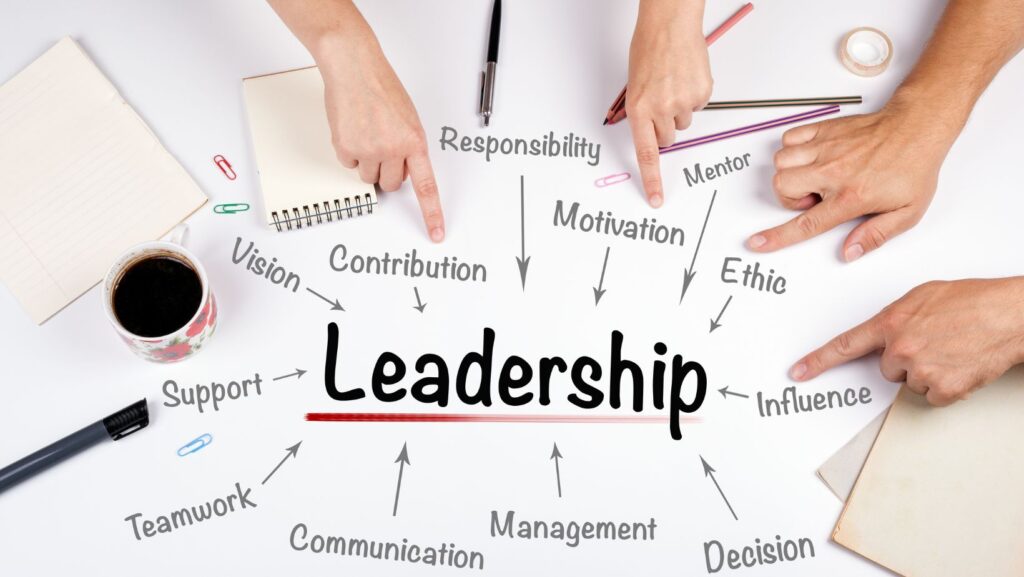Developing leadership skills in the workplace is essential for career growth, productivity, and job satisfaction. Strong leadership abilities can not only propel you up the career ladder but also enable you to inspire and motivate your team. Here’s a comprehensive guide on how to cultivate leadership skills in the workplace, whether you’re a seasoned professional or just starting your career.

To be an effective leader, commit to constant self-improvement. Leadership isn’t something you master once; it’s a journey. You can enhance your skills by reading leadership books, attending seminars, or even listening to podcasts. Additionally, seek feedback from colleagues and mentors to identify areas where you can improve. Continuous learning shows you’re adaptable and open to growth—a hallmark of great leaders.
Leadership is closely tied to effective communication. A good leader must articulate goals, provide constructive feedback, and motivate the team—all through clear, concise, and empathetic communication. Practise active listening, engage in open dialogue, and make an effort to understand others’ viewpoints.
Communication Tips:
- Start asking open-ended questions in meetings
- Regularly summarize conversations to ensure understanding
- Use positive body language to convey openness and confidence
Take Initiative and Be Proactive
Leaders don’t wait for opportunities to come to them—they create them. Look for ways to go above and beyond your job description. This could mean volunteering for projects, suggesting new ideas, or helping out a team member in need. Proactive behavior demonstrates a forward-thinking mindset and inspires others to take initiative as well.
Practical Steps to Take Initiative:
- Identify areas in your department that could benefit from improvement
- Offer to lead a new project or initiative
- Regularly share ideas or solutions with your supervisor or team
A big part of leadership is dealing with challenges effectively and calmly. Practice analyzing situations, evaluating potential solutions, and choosing the best course of action. When faced with an issue, focus on finding solutions instead of dwelling on the problem.
Problem-Solving Approach:

- Define the problem clearly
- List possible solutions and weigh their pros and cons
- Make a decision and follow through with a clear action plan
Emotional intelligence is the ability to recognize, understand, and manage your emotions while also being able to empathize with others. High EQ helps leaders handle stress, communicate more effectively, and make balanced decisions.
Steps to Increase EQ:
- Practice self-awareness by regularly reflecting on your emotions and reactions
- Work on empathy by trying to understand others’ perspectives
- Manage stress effectively through techniques like deep breathing or mindfulness
The most respected leaders are those who set a high standard and lead by example. This means embodying the qualities you want to see in others—integrity, hard work, respect, and accountability. When your team sees you model these behaviors, they’re more likely to adopt them as well.
Ways to Lead by Example:
- Stay calm under pressure to set a tone of resilience
- Admit mistakes openly and take responsibility
- Acknowledge team contributions and celebrate wins
Develop Strong Decision-Making Skills
Leaders are often tasked with making crucial decisions that can affect their team and the organization. Practice making decisions quickly, yet thoughtfully, by gathering all relevant information, considering the impact on stakeholders, and weighing the risks and rewards. Great leaders understand that a cohesive team achieves more than individuals working in isolation. Foster a collaborative environment by encouraging team members to share ideas, listen actively, and work toward common goals.

Your role is to facilitate a supportive atmosphere that inspires trust and cooperation.
Leadership development doesn’t have to be a solo journey. Find a mentor who can provide guidance, offer feedback, and share their own leadership experiences. Networking with other leaders can also offer valuable insights, new perspectives, and resources. To track your growth as a leader, set clear, achievable goals. This could be developing a specific skill, leading a project, or achieving a certain level of responsibility. Regularly review your progress and adjust your goals as needed to stay on track.
Developing leadership skills is a rewarding journey that not only boosts your career but also empowers you to make a positive impact in the workplace. By committing to continuous improvement, fostering a collaborative environment, and embracing opportunities for growth, you can become the leader your team looks up to and respects. Take these steps today, and start building a lasting leadership legacy.



